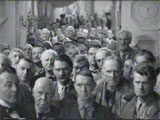 |
|||||
|
Lawrence Levine Part 2: Capra's Political Populism RealAudio: 28.8K | 56K Introduction | Previous | Next | JMMH |
|||||
| Another abiding paradox of Capra's life was that even as he himself lived the Alger dream, even as he struggled successfully to escape his lot as one of what he called "the common herd," he learned in the process to respect the strength and the resiliency of the common folk. He earned in the process an abiding grudge against the establishment, even as he joined it. And he made an apolitical populism part of his everyday vision. "The strength of America," he insisted, "is in the kind of people who can plant a seed, sow the grass. I wanted to glorify the average man, not the guy at the top, not the politician, not the banker, just the ordinary guy whose strength I admire, whose survivability I admire." [See Capra's interview with John F.Mariani in Focus on Film 27 (1977), 46-47.] The fact that Frank Capra grew up on the West Coast engendered in him a deep suspicion of the Eastern intellectual establishment, which he charged was "more or less allied to the European culture than to the American culture." [James Childs, "Capra Today: An Interview," Film Comment (Nov.-Dec., 1972), 23.] "Film in the rest of the world," he complained, "is either a pillar or the central core of a national culture. Here film is still a dirty word and Hollywood is a dirty, stinkpot place 3,000 miles away." [Capra interview with Mariani in Focus on Film, 41.] Hollywood is a dirty stinkpot place 3,000 miles away— that tells us a lot about Frank Capra. Through Capra’s eyes we begin to grasp a question which historians really haven’t dealt with sufficiently. And that is why marginal people like himself and his boss at Columbia pictures, Harry Cohn, were able to exert so much influence in the central expressive medium which so many guardians of tradition spent their time denigrating. Capra has frequently been accused of anti-intellectualism—a term that we often employ loosely and extend to cover struggles over intellectual legitimacy which is not quite the same thing as anti-intellectualism. There have been struggles throughout our history over intellectual legitimacy. Capra clearly felt that he was engaged in just such a struggle, "I’ve never had a very good standing
Capra was less interested in what we have come to call Middle America as a place than as fountainhead of American values; as a repository of traditions that captured the meaning of America; as an organic society from whose precincts the United States dare not stray too far. Raymond Williams has remarked that the only sure fact about the organic society is that it has always gone." [Raymond Williams, The County and the City (New York: Oxford University Press, 1975), 9-12.] To which I would add an equally "sure fact"—that almost invariably the organic society has barely just gone, leaving many nostalgic survivors in its wake. Perhaps it would be more accurate to say that the organic society has not gone so much as it is always in the process of going so that its disappearance becomes not a historic actuality, but an ongoing phenomenon which can still be reversed. I think to understand Frank Capra you need to understand that equation. Until World War II Capra was not merely lamenting something dead and gone, something one could only wax nostalgic about, but something that could still be saved, still be returned to vital health. It was this optimism, this hope, that gave his Depression films such dynamic vigor and enabled him to attract large and enthusiastic audiences. It’s hard to exaggerate Capra’s popularity. In a 1940 poll more people could name one of Capra's films than the films of any other director—and there are lots and lots of other marks of that popularity. Capra communicated his message visually as well as through his plots. "Masses," he once wrote, "is a herd term—unacceptable, insulting, degrading. When I see a crowd I see a collection of free individuals, each a unique person; . . . each a story that would fill a book; each an island of human dignity." [Raymond Williams, The Country and the City, 240.] The significant component of Capra’s genius as a filmmaker was his ability to find, visually, the individual in the mass. His wonderfully effective crowd scenes are filled with memorable faces which allow us to believe in the crowd as an entity in and of itself, even as we see it being composed of distinct human beings. "I gave each of the actors a personality," Capra commented, "a sense of being, a sense of existence—no matter how small the part, even if it was a walk-on." ["A Conversation with Frank Capra," in Richard Glatzner and John Raeburn, eds., Frank Capra: The Man and His Films (Ann Arbor: University of Michigan Press, 1975), 36, 29.] For Frank Capra there were no "bit" parts, no "bit" people. Lawrence Levine Part 1: Capra and the Politics of Culture
| |||||
|
Frank Capra's America Copyright © 1999 by The Journal for MultiMedia History | |||||
